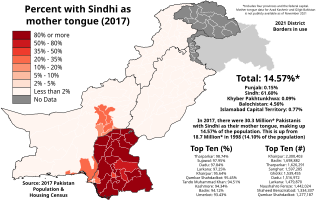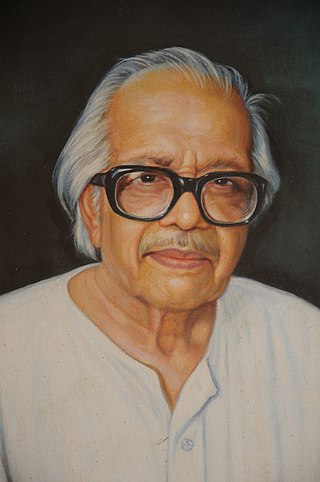
Sindhi is an Indo-Aryan language spoken by about 30 million people in the Pakistani province of Sindh, where it has official status. It is also spoken by a further 1.7 million people in India, where it is a scheduled language, without any state-level official status. The main writing system is the Perso-Arabic script, which accounts for the majority of the Sindhi literature and is the only one currently used in Pakistan. In India, both the Perso-Arabic script and Devanagari are used.

Konkani is an Indo-Aryan language spoken by the Konkani people, primarily in the Konkan region, along the western coast of India. It is one of the 22 scheduled languages mentioned in the Indian Constitution, and the official language of the Indian state of Goa. It is also spoken in Karnataka, Maharashtra, Kerala, Gujarat as well as Damaon, Diu & Silvassa.

Saurashtra is an Indo-Aryan language spoken primarily by the Saurashtrians of Southern India who migrated from the Lata region of present-day Gujarat to south of Vindhyas in the Middle Ages.

The Nawayath are an Indian community and a subgroup of Konkani Muslims. They speak the Nawayathi dialect of Konkani.
Bhatkal is a coastal town in the Uttara Kannada District of the Indian state of Karnataka. Bhatkal lies on National Highway 66, which runs between Mumbai and Kanyakumari, and has Bhatkal railway station which is one of the major railway stations along the Konkan Railway line, which runs between Mumbai and Mangalore.

Konkani Muslims are an ethnoreligious subgroup of the Konkani people of the Konkani region along the west coast of India, who practice Islam. Nawayath and "Nakhuda" Muslims from the North Canara district of Karnataka have similar origin as Konkani Muslims, but show a distinct ethnolinguistic identity due to geographical isolation of the Canara coast from the Konkan coast.
Goans is the demonym used to describe the people native to Goa, India, who form an ethno-linguistic group resulting from the assimilation of Indo-Aryan, Dravidian, Indo-Portuguese, Austro-Asiatic ethnic and/or linguistic ancestries. They speak different dialects of the Konkani language, collectively known as Goan Konkani. "Goanese", although sometimes used, is an incorrect term for Goans.

Ravindra Kelekar was a noted Indian author who wrote primarily in the Konkani language, though he also wrote in Marathi and Hindi. A Gandhian activist, freedom fighter and a pioneer in the modern Konkani movement, he was a well known Konkani scholar, linguist, and creative thinker. Kelekar was a participant in the Indian freedom movement, Goa's liberation movement, and later the campaign against the merger of the newly formed Goa with Maharashtra. He played a key role in the founding of the Konkani Bhasha Mandal, which lead the literary campaign for the recognition of Konkani as a full-fledged language, and its reinstatement as the state language of Goa. He authored nearly 100 books in the Konkani language, including Amchi Bhas Konkaneech, Shalent Konkani Kityak, Bahu-bhashik Bharatant Bhashenche Samajshastra and Himalayant, and also edited Jaag magazine for more than two decades.
Karnataka is a state in the southern part of India. It was created on 1 November 1956, with the passing of the States Reorganisation Act. Karnataka is bordered by the Arabian Sea to the west, Goa to the north-west, Maharashtra to the north, Telangana and Andhra Pradesh to the east, Tamil Nadu to the south-east, and Kerala to the south-west. The state covers an area of 74,122 sq mi (191,976 km2), or 5.83% of the total geographical area of India. It comprises 30 districts. Kannada is the official language of Karnataka and as per the 2011 census is the mother tongue of 66.5% of the population. Various ethnic groups with origins in other parts of India have unique customs and use languages at home other than Kannada, adding to the cultural diversity of the state. Significant linguistic minorities in the state in 2011 included speakers of Urdu (10.8%), Telugu (5.8%), Tamil (3.5%), Marathi (3.4%), Hindi (3.2%), Tulu (2.6%), Konkani (1.3%) and Malayalam (1.3%).

Konkani in the Roman script, commonly known as Roman Konkani or Romi Konknni refers to the writing of the Konkani language in the Roman script. While Konkani is written in five different scripts altogether, Roman Konkani is widely used. Roman Konkani is known to be the oldest preserved and protected literary tradition beginning from the 16th century AD.

Goykānaḍī or Kandavī is a Brahmic script that was once used in the territory of Goa to write Konkani and sometimes Marathi in the Konkan coast. Similarly, it was used by the trading Saraswat and Daivajna families along with the Modi script to maintain their accounts.

Canarese Konkani are a set of dialects spoken by minority Konkani people of the Canara sub-region of Karnataka, and also in Kassergode of Kerala that was part of South Canara.
Konkani is a southern Indo-Aryan language belonging to the Indo-European family of languages spoken in the Konkan coastal region of India. It has approximately 3.6 million speakers.
Konkani alphabets refers to the five different scripts currently used to write the Konkani language.
The Konkani language agitations were a series of protests and demonstrations in India, concerning the uncertain future of the Konkani language. They were held by Goans in the former union territory of Goa, Daman and Diu; then under the administration of the Maharashtrawadi Gomantak Party (MGP). The protests involved citizen journalism, student activism and political demonstrations. The civil unrest ceased when official status for Konkani in the Devnagari script was granted.

Languages spoken in the Indian Subcontinent belong to several language families, the major ones being the Indo-Aryan languages spoken by 75% of Indians and the Dravidian languages spoken by 20% of Indians. Other languages belong to the Austroasiatic, Sino-Tibetan, Tai-Kadai, and a few other minor language families and isolates. India has the world's second-highest number of languages (780), after Papua New Guinea (839). The first known translation of any Christian Scripture in an Indian language was done to Konkani in 1667 AD by Ignazio Arcamone, an Italian Jesuit.
Mavinkurve is a village in the coastal Karnataka in India, located in the Bhatkal taluk of Uttara Kannada district in Karnataka.

Konkani literature is literature in the Konkani language, mostly produced in three scripts: Roman, Devanagari and Kannada. Konkani literature is eligible for the Sahitya Akademi Award.

Meitei input methods are the methods that allow users of computers to input texts in the Meitei script, systematically for Meitei language.










